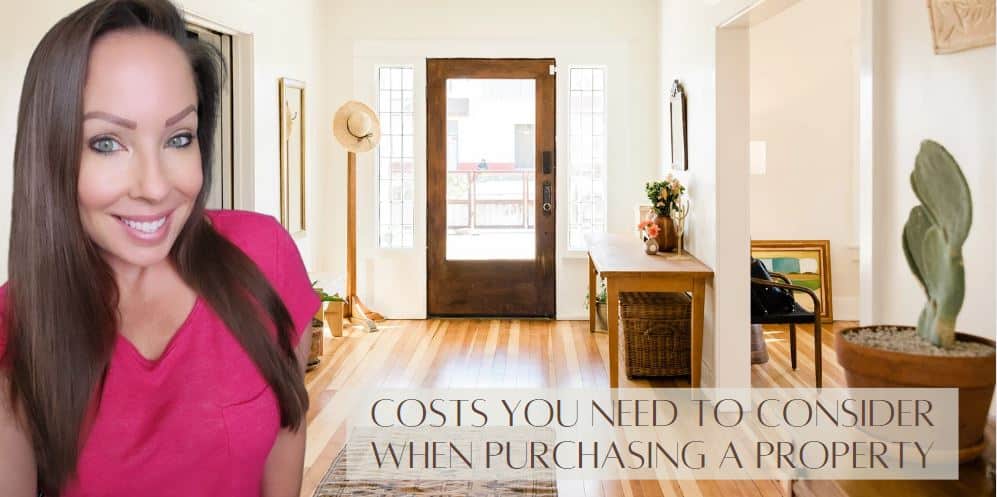
Costs when buying a house, whether expected or otherwise, should not be taken lightly. I’m sure it goes without saying that purchasing a home is one of life’s most significant financial decisions.
While it brings joy and a sense of achievement, it also comes with various expected costs beyond the purchase price. Prospective homebuyers must consider costs when buying a house, inclusive of all expenses, to ensure a smooth and well-planned transition into homeownership.
In this week’s article, we will explore the primary expected costs associated with buying a home, guiding buyers on how to navigate these financial obligations responsibly.
COSTS WHEN BUYING A HOUSE | DOWNPAYMENT
Have you been saving up for awhile, but you’re not sure if you have enough money to put towards a new home? The down payment is the initial payment made by the buyer towards the property’s purchase price. In the eyes of the lender, whether this is a bank or mortgage broker, ideally this will be 20% or higher, but it doesn’t have to be.
In fact, this amount more typically ranges from 3% to 20% of the property’s total cost, depending on the lender’s requirements and the buyer’s financial situation. Of course, the larger the down payment, the lower the mortgage loan required, which can lead to reduced interest payments over the life of the loan. It is in your benefit as the home buyer, to put more down than less, so your monthly carrying costs will be more manageable.
COSTS WHEN BUYING A HOUSE | CLOSING COSTS
When securing a mortgage, home buyers will encounter various closing costs. These expenses cover administrative and legal fees, appraisal charges, title insurance, loan origination fees, and more. On average, these costs can range from 2% to 5% of the home’s purchase price. It’s essential for buyers to thoroughly review these costs and negotiate with the lender as well as your lawyer to secure the best possible deal. It’s always a good idea to get costs in writing before moving ahead so there are no surprises later on.
COSTS WHEN BUYING A HOUSE | HOME INSPECTION
A crucial step before finalizing the purchase, a home inspection assesses the property’s condition and identifies any potential issues. While the cost can vary depending on the property’s size and location, it typically ranges from $400 to $600. Although this might seem like an extra expense, it can save buyers from unexpected repair costs down the road, or something you weren’t expecting and actually can’t afford after the fact. The main things you want to look for in a home inspection are the age and condition of the roof, furnace, windows, and plumbing. You also want to be on the look out for any work that’s been done without permits, and any prior damage.
COSTS WHEN BUYING A HOUSE | PROPERTY APPRAISAL
Lenders often require a professional appraisal to determine the fair market value of the property. The cost of this appraisal is usually borne by the buyer and typically ranges from $500 to $1,000. A favourable appraisal is essential for securing a mortgage, as it assures the lender that the property is worth the loan amount.
An important point to consider about a property appraisal, especially in advance when you’re submitting an offer, is that if the appraisal falls short, as the home buyer, you’d be responsible for covering the difference.
For example, if you put in an offer on a property for $900,000 and the appraisal comes back at $850,000, then you’d be required to make up the difference of $50,000. This is especially important in multiple offer situations, when emotions can get the better of some buyers, who waive conditions like financing to secure the property. You want to consider all of the possible outcomes and costs when buying a house before moving ahead.
COSTS WHEN BUYING A HOUSE | PROPERTY TAXES
Property taxes vary significantly based on the home’s location and assessed value. Local governments levy property taxes annually, and the amount due can be substantial. Homebuyers should research the property tax rates in the area and factor this ongoing cost into their budget. Also keep in mind that property taxes are subject to change at any time. Speaking for myself, we had the largest property tax increase this year, of the past twelves years we’ve been in our home. When we moved in, the taxes were $5,600/yr. They went up incrementally ever year, but this year, we saw an increase of $800, which was significant.
COSTS WHEN BUYING A HOUSE | INSURANCE
Lenders typically mandate buyers to obtain homeowner’s insurance to protect the property and its contents against damage or loss. The cost of insurance can vary widely based on the property’s location, size, and other risk factors. Buyers should shop around for the best rates and ensure they have adequate coverage. It’s better to be a little over insured than under! You may also want content’s insurance to cover the belongings in the home, along with the house itself.
In addition, if the down payment is less than 20% of the home’s purchase price, lenders often require CMHC mortgage insurance. This type of insurance protects the lender in case of default and can add an extra 2-5% of the loan amount to the annual mortgage costs. Buyers should aim to put down at least 20% to avoid these expenses.
COSTS WHEN BUYING A HOUSE | UTILITIES
When you’re moving into a new property, you’ll also need to set up accounts for all of your utilities such as gas, hydro, water etc. Most utility companies will charge a set up fee or first/last month’s fee – which can be $200-$300+/-. As such, keep this in mind to give yourself a bit of a buffer.
COSTS WHEN BUYING A HOUSE | FURNITURE
If you’re moving from a condo or another house into your new home, you may have an adequate amount of furniture, but there’s also a good chance there will be some additional things you’ll require. Make a list of what these items could be, create a budget, and give yourself an additional 10% for leeway. The costs buying a house can add up really quickly, so you want to be very detailed.
To give yourself some breathing room, you can consider a company like Leons or The Brick which tend to have “don’t pay for a year or more” kind of sales BUT make sure you set this up AFTER your home has closed, not before, or you could put your mortgage in jeopardy. Any shifts to your financial situation can impact this, so the same applies to other things. Don’t go racking up your credit card on anything, or buy a new car either. Save anything like that until after closing.
COSTS WHEN BUYING A HOUSE | MOVING COSTS
Moving into a new home can involve expenses for hiring professional movers, renting a moving truck, or purchasing packing supplies. The cost will vary depending on the distance and volume of belongings, so it’s crucial to plan ahead and obtain quotes from multiple moving and/or truck rental companies.
COSTS WHEN BUYING A HOUSE | REALTOR® FEES
You’re probably thinking, “I didn’t think there were any realtor fees when buying a home” – and you’d generally not be wrong. This said, it’s important to have a conversation with your REALTOR® in advance so you’re not on the hook for any fees. If you’ve agreed to the standard 2.5% commission on your Buyer Representation Agreement and the seller of the property you’d like to purchase has stated they will pay less (i.e. 1.5% or 2%), then you’d actually be on the hook for the difference. It’s important you’re aware of this, or you could face an unexpected costly expense. A good REALTOR® should always keep you informed of your obligations.
COSTS OF BUYING A HOUSE | HOMEOWNER’S ASSOCIATION FEES (may or may not be applicable)
In some communities, properties are subject to HOA fees. These fees cover the maintenance of communal areas and amenities, such as pools, gyms, and landscaping. HOA fees can range from modest to substantial, depending on the services and facilities offered by the association.
When purchasing a home, understanding and budgeting for the expected costs is crucial for a successful and stress-free experience. From the down payment and closing costs to ongoing expenses like property taxes, insurance, and utilities, each cost plays a vital role in the overall financial commitment. By researching and planning diligently, prospective homebuyers can make informed decisions and set themselves up for a secure and prosperous homeownership journey.
Here are a few other articles you could be interested in:
– First Time Home Buyer Support Guide
– Alternative Lending For Home Buyers
– How To Prepare For A Move
If you’re thinking about buying, selling, or investing, let’s talk! I can be reached at 647-896-6584, by email at info@serenaholmesrealtor.com or by filling out this simple contact form.
I hope you’ve found this article on the costs when buying a house to be helpful. For plenty of other great tips, make sure we’re connected on social @serenaholmesrealtor and subscribe to my YouTube Channel.










